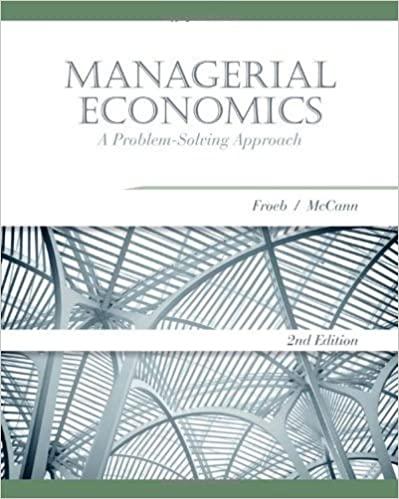Answered step by step
Verified Expert Solution
Question
1 Approved Answer
(6) Consider the following extensive form game. (0, 2) c' P2 C (0, 1) P2 B (2, 1) (0,0) P1 (0,2) a' P2 d



(6) Consider the following extensive form game. (0, 2) c' P2 C (0, 1) P2 B (2, 1) (0,0) P1 (0,2) a' P2 d 1-q b' (0, 1) (1,3) Find all (if any) pure strategy Nash Equilibrium. If player 1 chooses a player 2 will choose a' If player 1 chooses b, player 2 chooses a' If player 1 chooses c, player 2 c' If player 1 chooses d, player 2 has no choice If player 2 chooses a', player 1 chooses a If player 2 chooses b', player 1 is indifferent. If player 2 chooses c', player 1 chooses c If player 2 chooses d', player 1 chooses c There are 2 pure Nash Equilibriums (They are repeated twice) {c, c'} {a, a'} Find all (if any) pure strategy Subgame Perfect Nash Equilibrium. We use backward induction to get the subgame perfect Nash Equilibrium. Player 2 will never play b since b' is dominated by a'. Player 1, knowing the choices of player 2 will now make a choice between a and b. a has a payoff of 2 and b has a payoff of 0. Player 1 will therefore choose a Player 2 will also choose between c, and d'. c' has a payoff of 2 and d', 1. He will therefore choose c'. Player 1 will now compare between strategy a, c, and d. a has a payoff of 2, c has a payoff of 0 and d has a payoff of 1. He will choose a since t has a higher payoff. The subgame PNE is {a, a'} with a payoff of (2, 1). To get the pure strategy Bayesian equilibrium, we have to make use of the probabilities q and (1-9) For player 2, b' and d' are completely dominated by a' and b'. We therefore eliminate them to make the game easier. For player 1, c' is completely dominated by other strategies. We therefore eliminate it. Scenario 1. Player 1 chooses A If player 1 chooses A with probability q, his payoff will be 2q considering that player 2 will choose a' since it maximizes his payoffs. Scenario 2. Player 1 chooses B. If player 1 chooses B with probability 1-q, his payoffs will be 0 considering the fact that player 2 will choose a' since it has a higher payoff. Since q is a positive number between 0 and 1, the payoff of the first scenario will be higher than the second one. (The second one yield a payoff of zero for player 1 no matter what player 2 does). Therefore, player 1 will never play B if player 2 chooses a'. The value of q will therefore be 1 and 1-q will be 0. The equilibrium in this case remains similar to that of part b {a, a'} with a payoff of (2, 1)
Step by Step Solution
There are 3 Steps involved in it
Step: 1

Get Instant Access to Expert-Tailored Solutions
See step-by-step solutions with expert insights and AI powered tools for academic success
Step: 2

Step: 3

Ace Your Homework with AI
Get the answers you need in no time with our AI-driven, step-by-step assistance
Get Started


